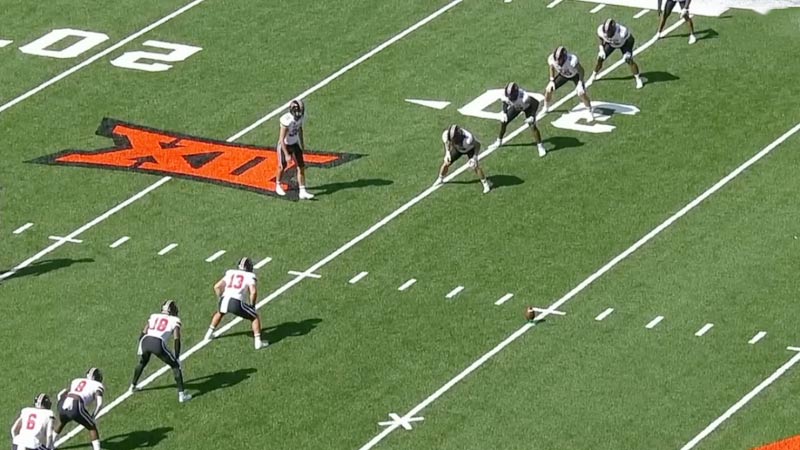In the fast-paced world of American football, every second counts. From the deafening roars of the crowd to the strategic plays executed on the field, the game is a finely tuned symphony of athleticism and strategy.
Amidst the gridiron battles and touchdowns, there’s a lesser-known aspect that can influence the course of a game: penalties. One such penalty, the “Delay Of Kickoff Penalty,” might not grab headlines, but its impact on field position, momentum, and overall game flow is undeniable.
In this comprehensive guide, we will try to delve into the intricacies of the Football Delay Of Kickoff Penalty, shedding light on its significance, enforcement, and how it shapes the ebb and flow of the game.
What Is Football Delay Of Kickoff Penalty?
In American football, a delay of kickoff penalty occurs when the kicking team fails to initiate the kickoff within the allotted time after the referee signals that the ball is ready for play.
This penalty is called if the kicking team does not kick the ball off within 25 seconds of the referee’s signal.
The delay of the kickoff penalty is designed to keep the game moving at a reasonable pace and prevent teams from unnecessarily stalling or delaying the game.
The penalty typically results in a 5-yard penalty assessed against the kicking team. This penalty yardage is enforced from the kicking team’s 35-yard line, which is the standard starting point for kickoffs in the NFL.
It’s important to note that this penalty specifically relates to the kickoff at the beginning of each half, after touchdowns, and after field goals.
It is distinct from other delay-of-game penalties, which can occur at other points during the game when a team fails to snap the ball within the prescribed time frame.
How Does a Football Delay Of Kickoff Penalty Happen?
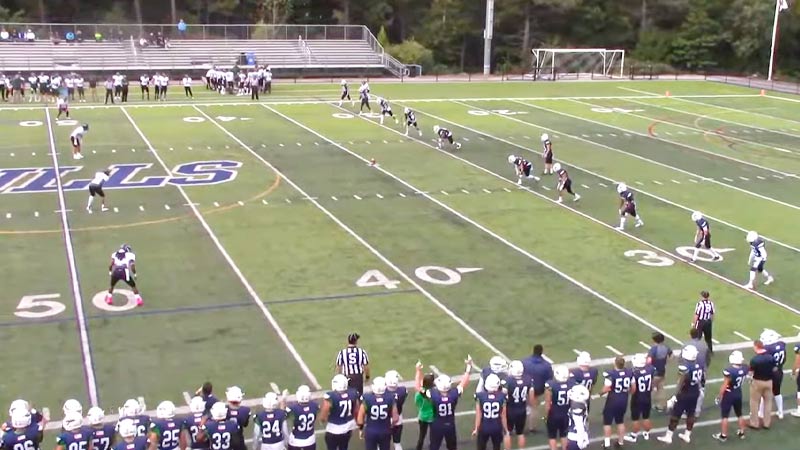
A delay of kickoff penalty in football can occur when the kicking team does not initiate the kickoff within the specified time frame after the referee signals that the ball is ready for play. Here’s how it generally happens:
Referee’s Signal
At the start of each half, after a touchdown, or after a field goal, the referee signals that the ball is ready for play by blowing the whistle, raising an arm, or making a similar signal.
This signifies that the game is about to resume and the kicking team should start the kickoff process.
25-Second Clock
After the referee’s signal, a 25-second play clock starts ticking. This means that the kicking team has 25 seconds to kick the ball off.
Delays or Infractions
If the kicking team does not initiate the kickoff within the 25-second time frame, a delay of kickoff penalty can be called.
This can happen due to various reasons, such as players not being properly positioned, confusion on the field, trying to waste time intentionally, or other factors that prevent the kickoff from happening promptly.
Penalty Enforcement
When the penalty is called, the referee will assess a 5-yard penalty against the kicking team. The penalty yardage is marked off from the kicking team’s 35-yard line (the standard starting point for kickoffs).
Kickoff Resumes
After the penalty is assessed, the kicking team will kick off from a slightly less advantageous position on the field. The receiving team then has the opportunity to return the kickoff as usual.
It’s important to note that while a delay of kickoff penalty is relatively uncommon, it can have implications for field position and potentially impact the outcome of the game.
The penalty is designed to encourage teams to start the game or restart play in a timely manner, thereby maintaining the pace of the game.
Consequences of Football Delay Of Kickoff Penalty
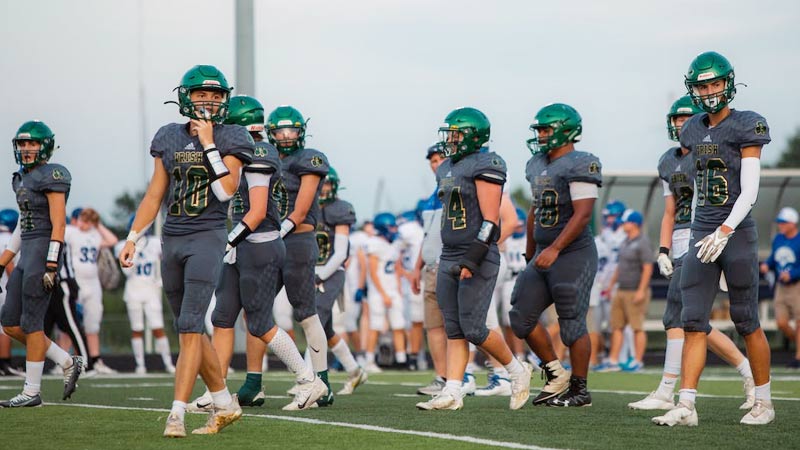
A delay of the kickoff penalty in football results in several consequences for the kicking team. These consequences are intended to discourage delays and ensure that the game proceeds smoothly and efficiently.
Here are the main consequences of a delay of kickoff penalty:
Penalty Yardage
The kicking team is penalized 5 yards for the delay of kickoff. The penalty yardage is marked off from the kicking team’s 35-yard line, which is the standard starting point for kickoffs.
This means that the kicking team will have to kick off from a slightly less advantageous field position.
Field Position
The penalty can impact the field position of both teams. The receiving team will have a better starting field position due to the penalty yardage assessed against the kicking team.
Conversely, the kicking team’s coverage unit will have a more challenging task in preventing a favorable return for the receiving team.
Time Management
In addition to the penalty yardage, the delay itself can waste valuable time for the kicking team. In situations where a team is trying to conserve time or make a strategic play, a delay of kickoff penalty can be particularly detrimental.
Game Momentum
Football is a game of momentum, and a delay of kickoff penalty can disrupt the flow of the game for the kicking team. It can interrupt the team’s rhythm and potentially affect their ability to capitalize on a recent score or make a defensive stand.
Coaching and Player Accountability
Coaches often emphasize discipline, time management, and execution to their players. A delay in the kickoff penalty reflects poorly on a team’s preparation and execution, and it may lead to increased accountability and coaching focus on these aspects.
Receiving Team Advantage
The receiving team may benefit from the penalty by gaining a better starting field position. This could lead to improved field position for their offense and potentially a better chance of scoring on the ensuing drive.
Game Flow
Delays in the game can disrupt the overall flow and pacing of the match, potentially affecting the viewing experience for fans and the overall dynamics of the game.
It’s worth noting that while a delay of kickoff penalty can have consequences, it is relatively uncommon and is typically seen as a minor penalty compared to other infractions in the game.
Nevertheless, it serves as a deterrent to prevent teams from intentionally stalling or delaying the kickoff process.
Football Delay Of Kickoff Penalty Signals
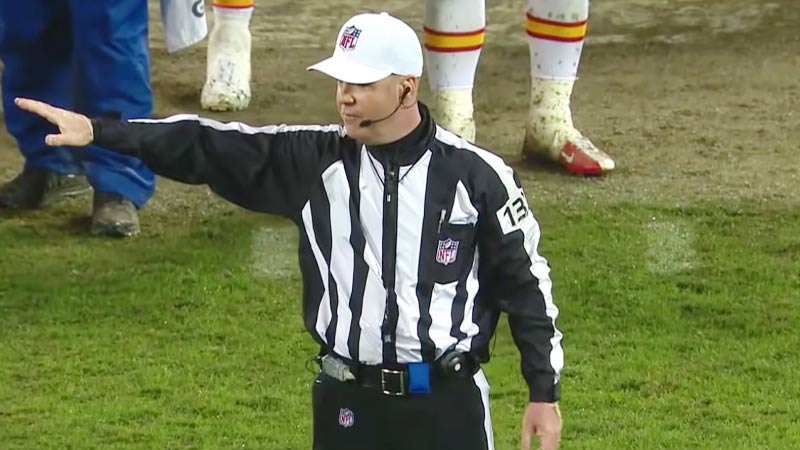
The delay of the kickoff penalty is signaled by the officials to communicate to the players, coaches, and spectators that a penalty has been assessed against the kicking team for failing to initiate the kickoff within the specified time frame.
The signal for a delay of kickoff penalty is quite straightforward and recognizable. Here’s how it is typically signaled:
Flag
The official who observes the delay of kickoff will throw a penalty flag onto the field to indicate that a penalty has occurred.
Whistle
The referee will blow the whistle to stop the play and indicate that a penalty has been called.
Signal
The official will then make a specific hand signal to indicate the type of penalty. For a delay of kickoff penalty, the official will raise one arm straight up with an open palm. This signal is often interpreted as a “dead ball foul,” meaning the penalty occurred before the ball was put into play.
Announcement
The referee or another official will use a microphone to announce the penalty to the crowd and the teams. They will provide a brief explanation of the penalty, stating that it is a “delay of game on the kicking team” or similar wording.
Penalty Enforcement
The penalty yardage will be assessed against the kicking team, and the receiving team will have the option to either accept the penalty and gain the field position advantage or decline the penalty and take the ball to the spot where it would have been kicked.
The delay of the kickoff penalty signal is distinct and easily recognizable, allowing everyone involved to understand the reason for the stoppage in play and the resulting consequences for the kicking team.
Impact of Delay Of Kickoff Penalty
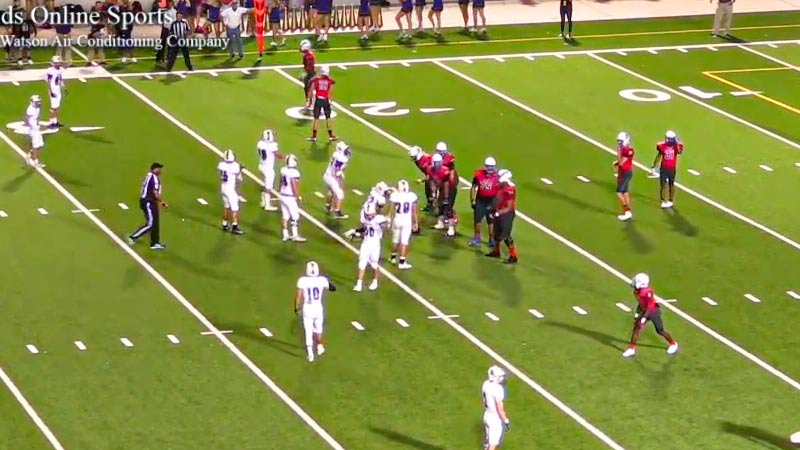
The impact of a delay of kickoff penalty in American football can have several consequences that affect the game, teams, and overall dynamics. Here are some of the key impacts:
Field Position
The receiving team gains an advantage in field position due to the penalty yardage assessed against the kicking team.
They will start their offensive possession at a more favorable spot on the field, potentially giving them a better opportunity to score.
Kicking Team Disadvantage
The kicking team is penalized both in terms of yardage and potential momentum.
They have to kick off from a less advantageous position, making it harder to achieve a touchback (where the receiving team starts at the 25-yard line in the NFL) or to pin the receiving team deep into their own territory.
Game Flow
A delay of the kickoff penalty disrupts the natural flow of the game and can lead to a pause in the action. This can affect the momentum and energy of both teams and potentially impact the overall pace of the game.
Time Management
In situations where time is a critical factor, such as at the end of a half or when a team is trying to mount a comeback, a delay of kickoff penalty can be particularly detrimental. It can limit the kicking team’s opportunities to make plays or score points.
Team Discipline
Penalties, including delay of kickoff penalties, reflect on a team’s discipline, preparation, and attention to detail. Coaches often emphasize avoiding penalties and maintaining focus, so such infractions can lead to frustration and potential coaching adjustments.
Strategy Alteration
The receiving team may adjust their return strategy based on the penalty, taking advantage of the improved field position. Likewise, the kicking team may alter their coverage plans to account for the different starting points.
Fans and Spectators
Delays and penalties can impact the fan experience by interrupting the flow of the game. Fans may become frustrated by stoppages and breaks in action caused by penalties.
Psychological Impact
Penalties can have a psychological impact on players, coaches, and teams. A delay of the kickoff penalty might affect the confidence and morale of the kicking team while boosting the spirits of the receiving team.
TV Broadcast
In televised games, penalties like a delay of kickoff can lead to extended commercial breaks or additional discussions and replays, affecting the broadcast’s rhythm and pacing.
A delay of the kickoff penalty can alter the strategic and emotional dynamics of a football game.
While it’s not one of the most significant penalties in terms of yardage, it can still influence the outcome of a drive or impact a team’s ability to control the game’s momentum.
Penalties That Are Similar to Delay Of Kickoff
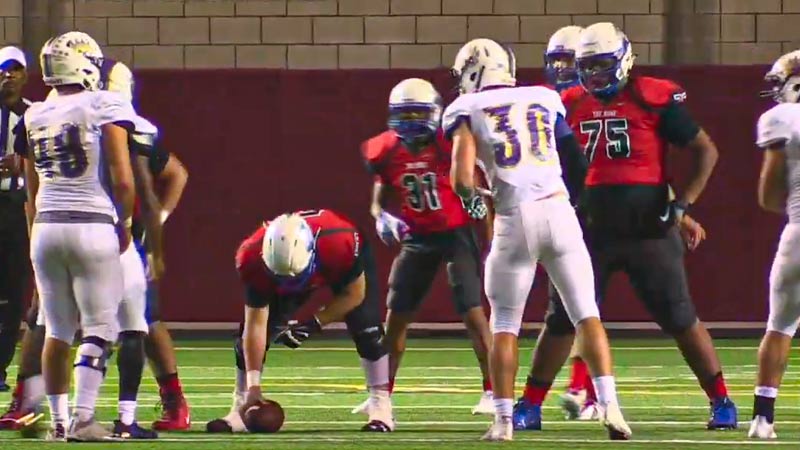
Several penalties in football share similarities with the delay of kickoff penalty in terms of their impact on the game and their intent to maintain fair play and pace. Here are a few penalties that are similar in nature or consequence:
Delay of Game (Offense)
Just as there can be a delay of kickoff penalty, there can also be a delay of game penalty on the offensive side. This occurs when the offense fails to snap the ball before the play clock expires. Like the kickoff penalty, it results in a 5-yard penalty.
Delay of Game (Defense)
While less common, a defense can also be penalized for causing a delay in the game by preventing the offense from snapping the ball in a timely manner. This penalty is usually called if defenders intentionally prevent the offense from lining up and snapping the ball.
False Start
A false start penalty is called when an offensive player (usually a lineman) moves before the snap, simulating the start of the play. This penalty results in a 5-yard loss for the offense and can disrupt the flow of the game.
Illegal Formation
This penalty is called when the offense lines up with an incorrect number of players on the line of scrimmage or fails to have enough players on the line. It can lead to a 5-yard penalty.
Illegal Substitution
If a team doesn’t properly substitute players within the allowed time or tries to confuse the opponent with substitutions, an illegal substitution penalty can be called, resulting in a 5-yard penalty.
Offensive Holding
Offensive holding penalties occur when an offensive player holds or obstructs a defender, usually to prevent them from reaching the ball carrier or quarterback. Holding penalties can result in a 10-yard loss.
Defensive Pass Interference
If a defensive player interferes with an eligible receiver’s ability to catch a pass, the result is a defensive pass interference penalty. The offense is awarded a first down and the ball is moved to the spot of the foul or to the opponent’s 1-yard line if the foul occurs in the end zone.
Unsportsmanlike Conduct
This penalty is called for behavior that is deemed unsportsmanlike or inappropriate, such as taunting, excessive celebration, or arguing with officials. Unsportsmanlike conduct penalties result in a 15-yard loss and can affect field position.
Encroachment/Offside
Encroachment (defense) and offside (offense) penalties occur when a player crosses the line of scrimmage before the snap. These penalties result in a 5-yard loss.
These penalties, like the delay of kickoff, serve to regulate the game, maintain fairness, and encourage sportsmanship while impacting the flow, momentum, and strategy of the teams involved.
FAQs
What exactly is a Delay Of Kickoff Penalty?
A Delay Of Kickoff Penalty occurs when the kicking team fails to initiate the kickoff within the designated time frame after the referee signals that the ball is ready for play. This penalty is meant to maintain the pace of the game and prevent intentional delays.
How is the penalty signaled to the teams and spectators?
When a Delay Of Kickoff Penalty is called, an official throws a penalty flag onto the field and blows the whistle to signal a stoppage of play. The official then raises one arm with an open palm, indicating a “dead ball foul” due to the delay.
What are the consequences of a Delay Of Kickoff Penalty?
The consequences of this penalty include a 5-yard yardage loss for the kicking team, which is enforced from their 35-yard line, the standard starting point for kickoffs. This results in improved field position for the receiving team, potentially affecting their offensive drive.
How does a Delay Of Kickoff Penalty impact the flow of the game?
Beyond the yardage loss, a Delay Of Kickoff Penalty disrupts the natural rhythm and momentum of the game. It can lead to pauses in action, affecting the energy of both teams and potentially altering strategic decisions.
How does a Delay Of Kickoff Penalty compare to other penalties in football?
Similar to penalties such as “Delay of Game” on offense or defense, a “False Start,” and “Illegal Formation,” the Delay Of Kickoff Penalty focuses on maintaining fair play, sportsmanship, and game pacing. While not the most severe penalty, its impact can still be felt on the field.
Wrapping Up
In the intricate dance of American football, penalties like the Delay Of Kickoff Penalty play a vital role in shaping the outcome of the game. Beyond the simple yardage loss, this penalty affects field position, momentum, and even psychological dynamics.
As players and fans alike immerse themselves in the thrilling spectacle of the sport, it’s worth appreciating the finer details, such as penalties, that contribute to the grand tapestry of the game.
So, the next time you hear that whistle blow and see an official’s hand rise to signal a Delay Of Kickoff Penalty, remember that every action on the field has its consequences, echoing through the ebbs and flows of the game.
So, here I’m taking my leave. See you soon. Thank you.

